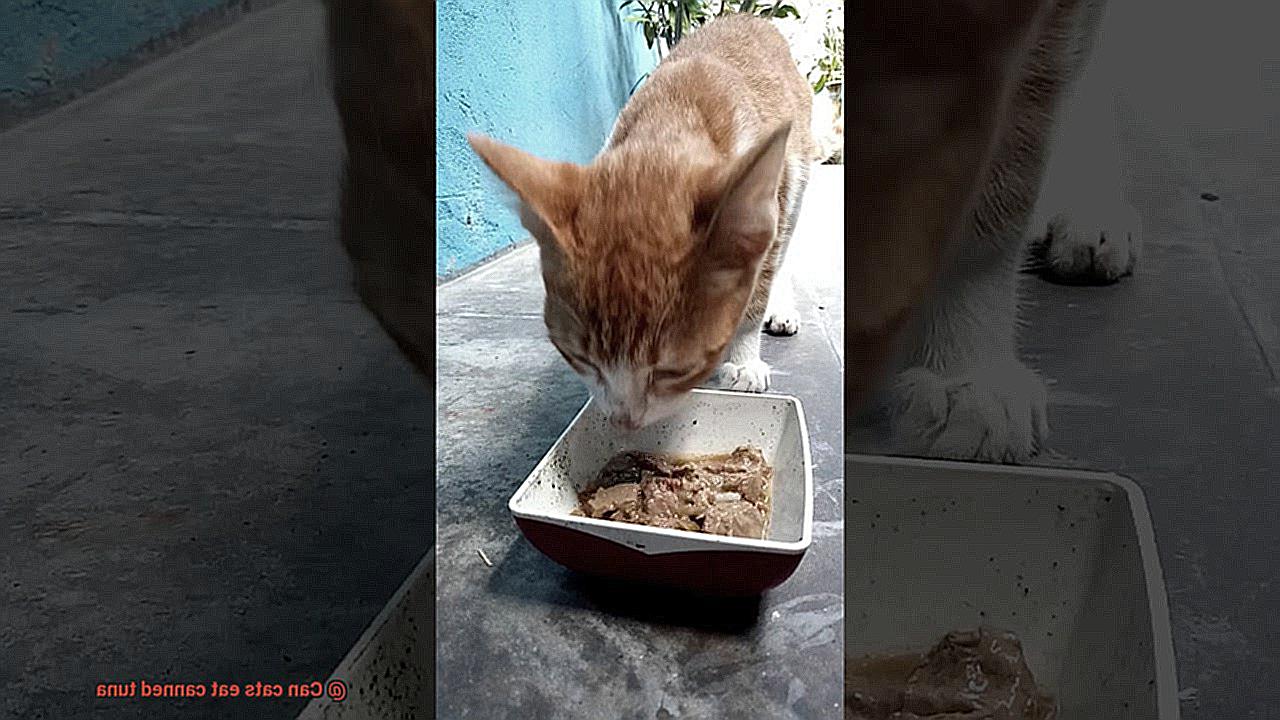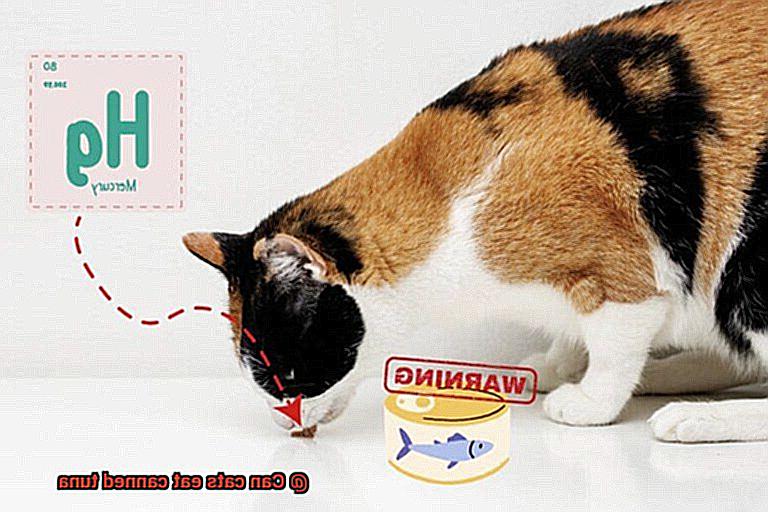Our feline friends are notorious for their discerning taste buds, making it a challenge to find the perfect food that they will happily devour. As a responsible cat-parent, you want to ensure that your fur baby is receiving all the necessary nutrients to stay healthy and strong. And when it comes to cat food, tuna often comes to mind. But can cats eat canned tuna?
The answer isn’t as simple as yes or no. While cats can consume canned tuna, there are some essential things you need to consider. Firstly, not all cats may enjoy the taste of tuna; some may love it, while others might avoid it altogether. Secondly, not all types of tuna are created equal – some have high levels of mercury which can be harmful to your cat’s health. Lastly, feeding your cat solely on canned tuna can lead to severe nutritional deficiencies.
That being said, incorporating tuna into your cat’s diet as an occasional treat or supplement to their regular meals is possible but should never replace their usual cat food. In this article, we will delve deeper into whether or not cats can eat canned tuna and explore its potential benefits and risks while providing tips on how to safely add this fishy delight into your pet’s diet. So let’s dive in.
Nutritional Benefits of Canned Tuna for Cats
The good news is, when fed in moderation, canned tuna can provide several nutritional benefits for cats. However, it’s crucial to understand the potential risks and benefits before making it a regular part of their diet.
While canned tuna is high in protein, it’s not nutritionally complete for cats. Feeding your cat only canned tuna as a regular part of their diet can lead to deficiencies and health problems down the line. Therefore, it’s essential to provide a balanced diet that includes other sources of nutrients.
Protein is essential for maintaining muscle mass and supporting the immune system, and canned tuna is an excellent source of protein for cats. With approximately 30 grams of protein per 100 grams of tuna, it’s a great option for cats who may not be getting enough protein from their regular diet.
In addition to protein, canned tuna contains several essential vitamins and minerals that are important for a cat’s overall health. Vitamin D helps regulate calcium and phosphorus levels in the body, which are vital for strong bones. Potassium is essential for muscle and nerve function, promoting healthy heart function.
It’s important to note that not all canned tuna is created equal. Some varieties may contain high levels of mercury or other toxins that can be harmful to cats if consumed in large amounts. To ensure your cat’s safety, choose canned tuna that is labeled as safe for human consumption and limit their intake to one or two small servings per week.
Potential Risks of Feeding Canned Tuna to Cats
While feeding them canned tuna may seem like a quick and easy option, it’s important to be aware of the potential risks it poses to their health.
Firstly, canned tuna lacks essential nutrients that cats need to thrive. Although high in protein, it fails to provide other necessary nutrients that can lead to nutritional deficiencies and health issues in the long run. So, while it may be tempting to feed your cat tuna regularly, it’s best to opt for commercial cat food that is specifically formulated to meet their dietary requirements.
Moreover, some cats may be allergic to tuna, which can result in digestive problems, skin irritation, and other health concerns. Keep an eye out for any allergic reactions and discontinue feeding them tuna if necessary.

Another significant risk of feeding canned tuna to cats is the presence of mercury. Tuna is a type of fish that is high in mercury levels, which can be toxic to cats if consumed regularly. Mercury poisoning can cause neurological problems, tremors, and in severe cases, even death. To avoid this, limit the amount of canned tuna your cat consumes and avoid feeding them human-grade tuna as it may contain higher levels of mercury.
Canned tuna may also contain harmful substances such as preservatives, additives, and artificial flavors that can trigger allergic reactions or digestive problems in cats. These ingredients can have a negative impact on your cat’s health in the long run.
Lastly, feeding canned tuna to cats can lead to behavioral issues like food obsession and picky eating habits. Cats find the strong aroma and flavor of tuna irresistible, making them refuse other types of food and become dependent on it as their primary source of nutrition. This can result in health problems like malnutrition and obesity.
Types of Canned Tuna to Avoid
Not all types of canned tuna are safe for your cat to consume. Certain varieties can be harmful to their health, leading to nutritional deficiencies, allergic reactions, mercury poisoning, and behavioral issues. To keep your cat healthy and happy, it’s important to know which types of canned tuna to avoid.
Firstly, avoid feeding your cat any tuna that is high in mercury. Albacore tuna, also known as “white tuna,” is often higher in mercury than other types of tuna. When consumed in large quantities or on a regular basis, this can cause neurological problems and even death in severe cases. So it’s best to limit your cat’s intake of this particular variety.
Another type of canned tuna to avoid is any tuna that has been packed in oil or any other type of sauce. These added ingredients can contain high amounts of sodium and other preservatives that can be harmful to your cat’s health over time. Instead, opt for canned tuna that is packed in water or broth. Your cat will still get the nutritional benefits of the fish without the added risks.
Lastly, avoid feeding your cat canned tuna that has been seasoned with any spices or herbs. Cats have sensitive digestive systems and can easily become sick from consuming foods that are too heavily seasoned or spiced. Stick to plain canned tuna if you’re planning on feeding it to your cat.

Allergic Reactions in Cats from Eating Canned Tuna
It’s crucial to be aware of the possible allergic reactions in cats from eating canned tuna and take necessary precautions to keep your feline friend safe.
Although allergic reactions in cats from eating canned tuna are not very common, they can still happen. Tuna contains high levels of histamine, which can trigger an allergic response in some cats. Symptoms may include vomiting, diarrhea, itchiness, and skin rash.
Moreover, canned tuna may contain other harmful ingredients for cats. Some brands add salt or other preservatives to their tuna, which can be dangerous to cats in large amounts. Remember that tuna should not be the primary source of a cat’s diet since it doesn’t provide all the essential nutrients that a cat needs.
To avoid allergic reactions in cats from eating canned tuna, it’s best to avoid feeding your cat tuna altogether or only give small amounts as an occasional treat. Be careful when choosing canned tuna brands and opt for high-quality ones that don’t contain preservatives or harmful ingredients. Always read the label carefully before feeding your cat any type of human food, including canned tuna.
If your cat experiences an allergic reaction after eating canned tuna, it is critical to seek veterinary care promptly. Your vet may prescribe antihistamines or other medications to treat the allergic reaction and alleviate your cat’s symptoms.
Moderation is Key When Feeding Canned Tuna to Cats
While it may seem like a harmless treat, it’s important to remember that moderation is key when it comes to feeding canned tuna to cats. As obligate carnivores, cats require a diet that is high in protein and low in carbohydrates. While canned tuna is rich in protein, it lacks essential vitamins and minerals that are necessary for your cat’s overall health and wellbeing.
Moreover, canned tuna can be high in mercury which can cause mercury poisoning if fed in excess. This can lead to neurological problems which can be fatal. To prevent this, it’s crucial to limit the amount of canned tuna you give your cat. A small amount of canned tuna once or twice a week is safe for most cats as a supplement to their regular diet.

Not only that, but canned tuna that is packed in oil or has added salt can also be harmful to cats. Too much salt can lead to dehydration and kidney problems while oil can cause digestive problems and weight gain. That’s why it’s essential to choose high-quality brands of canned tuna that are packed in water and do not have any added salt or oil.
Alternatives to Canned Tuna for Cats
While canned tuna may seem like an easy option, it’s high in mercury and sodium, which can lead to health problems in cats if consumed regularly. Luckily, there are plenty of alternatives available that offer the same nutritional benefits without any risks.
One fantastic alternative to canned tuna is cooked chicken. Chicken is a great source of protein and low in fat, making it an excellent option for cats. Whether you serve it alone or mixed with healthy ingredients like cooked vegetables or brown rice, your cat will love the taste and benefit from its nutritional content.
Another healthy alternative is canned salmon. Salmon is also an excellent source of protein and contains omega-3 fatty acids that promote healthy skin and coat. However, be sure to check the sodium levels on the label before feeding it to your cat.

If you want to give your cat fresh fish, tilapia or cod are both safe options that are low in mercury and provide the same nutritional benefits as canned tuna. Your cat will love the taste of fresh fish while enjoying all the necessary nutrients.
Finally, specially formulated cat foods that contain fish as one of their main ingredients can provide all the necessary nutrients for your cat while avoiding harmful levels of sodium and mercury.
8cXb2A3wL7U” >
Conclusion
In conclusion, while canned tuna may seem like a tasty treat for your feline friend, it’s important to be careful and not overdo it. Cats are obligate carnivores and require a balanced diet rich in protein and essential nutrients to stay healthy.
Although canned tuna is high in protein and contains several vital vitamins and minerals, it lacks other necessary nutrients that cats need. Additionally, some types of canned tuna may contain high levels of mercury or other harmful substances that can lead to health problems if consumed regularly.
Therefore, it’s crucial to limit your cat’s consumption of canned tuna and choose high-quality brands that are packed in water or broth without any added salt or oil. You can also consider alternatives such as cooked chicken, canned salmon, fresh fish, or specially formulated cat foods containing fish as one of their primary ingredients.
As a responsible cat-parent, it’s your duty to ensure your fur baby receives all the necessary nutrients they need to stay healthy and strong.







